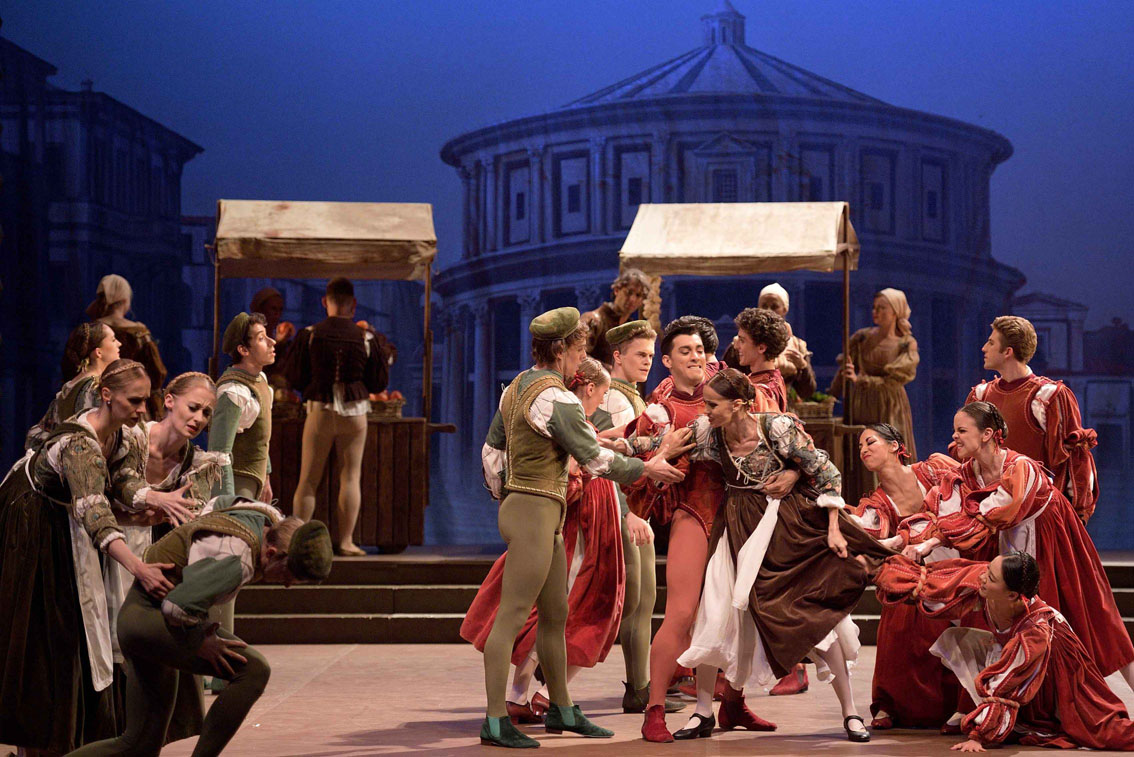
It is not hard to see why a tale of youngsters in opposition to an oppressive older generation might have appealed to Rudolf Nureyev, and it is his interpretation of Romeo and Juliet that we see in this ENB production. There will be those who will question this choice of choreographer, for generally balletomanes go for Kenneth Macmillan’s 1965 version, the one which famously rejuvenated Fonteyn’s career in partnership with the Russian rebel himself. Nureyev stays very faithful to Shakespeare’s text, sometimes fussily so, and there are times when simply too much is happening. For example, there are four mysterious dice-throwing gamblers who we see when the curtain first rises and again at the very end. They remind us, perhaps, that Romeo is ‘fortune’s fool’, but they are an unnecessary distraction, and they intrude upon the solemn reconciliation of the two families in the final scene.
However, there are many superb moments, one such being when the magnificently attired Capulets arrogantly strut their stuff at the ball held to announce Juliet’s betrothal to Paris. Juliet dances chastely with Paris, all feather-light poise and grace, but after touching hands with the masked Romeo she becomes energised, skittish even. She shows off recklessly to the bemused guests as she experiences love for the first time. Jurgita Dronina gives a wonderful performance as Juliet; technically brilliant, yes, but also full of girlish character.
Romeo and Juliet may be famous as a love story, but there is a great deal of violence, too. Swordfights present a particular challenge. Apart from the physical skill required, it is also necessary to strike a proper balance between gritty, blood and guts realism, which would seem incongruous in a ballet, and overly stylised gestures, which would lack all sense of danger. The fight scenes in this production are very well done, full of impressive swordplay, particularly from Fabian Reimar’s Tybalt. He is truly a ‘Prince of Cats’, sharp-clawed and short-tempered. His fight with Mercutio begins in relative good humour, but we can see that his pent-up aggression is likely to burst out at any moment. Pedro Lapetra, one of ENB’s ‘emerging dancers’, is a very appealing Mercutio, a clowning jackanapes who takes a shameless delight in bawdy behaviour. When fatally stabbed by Tybalt, his death throes are treated as yet another bravado performance by his friends, until they belatedly realise that he is no longer joking.
An outstanding later scene is when Juliet contemplates taking the potion given to her by Friar Lawrence. She struggles to choose: should she risk being buried alive, or would it be better to end her life there and then? The music swells, subsides and swells again, as though she is being tossed on a sea of doubts and fears. Dronina vividly conveys her desperate dilemma in every gesture; all the girlishness has gone, as the potion is downed in one.
In the earliest scenes, Aaron Robison’s Romeo is perhaps a touch anonymous, but he comes into his own later, particularly in the great pas de deux that depicts his one night with Juliet before his banishment to Mantua. He carries off the lifts – there are twenty-two of them – with seeming effortless, long-limbed aplomb. But perhaps his most memorable moment comes when he says farewell to his friend Benvolio (James Forbat), who has come to tell him of Juliet’s apparent death. Benvolio is seen as someone that Romeo can literally fall back on, or indeed, leap back on, but even a friendship that strong cannot prevent Romeo from rushing off to his death.
Conductor Gavin Sutherland and the English National Ballet Philharmonic play Prokofiev’s wonderful, score thrillingly; the sweetly lyrical passages soar, and the bitter dissonances bite sharply. But it is Jurgita Dronina’s Juliet that is the outstanding performance of the evening. She is utterly captivating. ★★★★☆ Mike Whitton 22nd November 2017

